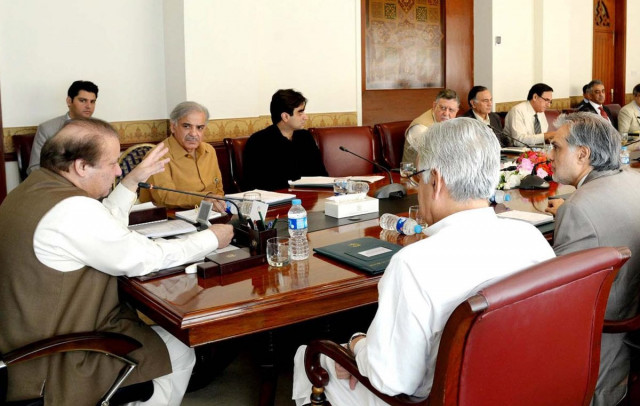New energy policy: Govt to end blackouts in three years
Bulk of electricity subsidies to be phased out; policy will be implemented with provincial consent.

Prime Minister Nawaz Sharif chairing a high level meeting to finalize energy policy at Prime Minster Office in Islamabad on Friday. PHOTO: PPI
Prime Minister Nawaz Sharif wrapped up consultations on the energy policy at a high-level meeting on Friday. A draft of the policy will be submitted to him for formal approval. The draft will also be tabled before the Council of Common Interest (CCI) and the consent of the provinces will be sought before it is implemented.
According to sources, the prime minister is expected to unveil the energy policy ahead of his scheduled visit to China. The move will send a good signal to Chinese investors and lure them into investing in Pakistan’s power sector.

Currently, 13.5 million out of the total 20.5 million power consumers in Pakistan are using 300 units per month. “Under this plan, the power subsidy will no longer cover 40% of consumers, saving the national exchequer Rs270 billion according to the current electricity rate of Rs14.70 per unit,” an official told The Express Tribune.
The new policy also envisages increasing power generation from 12,200 megawatts to 26,800 megawatts and reducing average electricity rates from Rs14.70 to Rs10 per unit by shifting the burden from thermal to hydel power plants and switching to cheaper alternative fuel such as coal.
Currently, the share of hydel power in the total energy mix is hardly 30%. The policy aims to boost its share to 70% by building both large and small dams and carrying out some other initiatives to increase generation from 23,000 MW to 34,824MW.
Coal-fired, run-of-the-river and biomass power projects will also be launched on a priority basis to improve the energy mix. Efficient plants will receive fuel on a priority basis as well to reduce the cost of power. Older inefficient thermal plants, meanwhile, will be converted to coal.
Under the policy, the government also plans to phase out CNG usage and captive power plants to divert gas supply to efficient power plants in a bid to further reduce costs. Captive plants are among the most inefficient plants, consuming around 450 million cubic feet of gas per day (mmcfd). CNG consumers, on the other hand, account for 400 mmcfd consumption. Gas will be diverted from these sectors by raising prices.

Uniform prices for all gas consumers except for domestic ones will be implemented to end cross subsidy. Presently, gas consumers enjoy an annual Rs45 billion subsidy – a major concern for multilateral donors. The government plans to reduce unaccounted for gas (UFG) in order to make more gas available to the power sector. The well-head price of gas will be enhanced as well to attract investment in the sector. The government also plans to focus on the exploration of shale and tight gas.
According to sources, the government will task the heads of power and gas distribution companies to reduce losses and improve operations. The heads who fail to achieve the target will be replaced, they added.
Power and gas companies will also be unbundled into small distribution companies to reduce losses and improve service delivery. Transmission and distribution losses will be reduced from 36% to 16% by controlling power theft. The policy also recommends action against bill defaulters within a 60-day period to help clear circular debt.
The government plans to expedite the import of 1,100 megawatts from Iran, 1,000 megawatts from Central Asian states and 500 megawatts from India to bridge the electricity shortfall. It also aims to focus on exploiting coal reserves in Thar.
The new policy also seeks to control the theft of furnace oil and reduce transport costs by laying down new pipelines. At present, furnace oil worth roughly $200 million is stolen every year.
A performance contract will be signed between generation companies and Pakistan State Oil to ensure timely payment of oil supply bills. PSO – whose current major supplier is Kuwait Petroleum Corporation – will be directed to purchase oil on a tender basis instead of purchasing it from a single supplier to reduce costs.
In an official statement on Friday, Prime Minister Nawaz Sharif said the new energy policy will be a panacea for all of the country’s power woes. “People and economy have suffered badly at the hands of the crippling power crisis and it is high time that prudent and consistent policies were pursued to come out of this morass,” it stated.
Published in The Express Tribune, June 29th, 2013.



















COMMENTS
Comments are moderated and generally will be posted if they are on-topic and not abusive.
For more information, please see our Comments FAQ